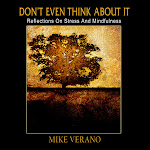 Empty yourself of everything.
Empty yourself of everything.Let the mind rest at peace
Tao Te Ching
Stress is as much a part of holiday tradition as greeting cards, presents, and awkward moments at family gatherings. The conventional wisdom is that while this should be a time of peace on earth and good will towards men, it’s equally the time for discord and ill will.
How is it that a festive time turns into a carnival of tension and worry? Why is it that high blood pressure and tension headaches show up as much as eggnog and fruitcake? Does this have something to say about the holiday season, or is it a commentary on the way we see stress?
The holidays do not bring us stress; we bring stress to the holidays. If you look closely at the “gift” of inner tension, you will find that it was neatly packed, wrapped, and hand-delivered by none other than our self. This is very good news. It opens up the possibility that we can ask for, and if we have not been too naughty, receive, the present of inner peace this season.
Before going on, I want to share with you a Stressmas carol that I wrote to sum up how many of us feel as we move headlong into the not-so-silent nights ahead:
(Sung to the tune of Jingle Bells)
Jangled nerves, jangled nerves
Jangled all the day
Oh how sad it is to spend
Our holiday time this way
Dashing through the malls
With a cart that’s gone astray
Back to the bank we go
Crying all the way
Bells on registers ring
Making spirits sigh
Oh, what bills the mailman brings!
Why is my interest rate so high?
Jangled nerves, jangled nerves
Jangled all the day
Oh how sad it is to spend
Our holiday time this way
A day or two ago
I felt my chest grow tight
And very soon I found myself
Pacing through the night
I tried to get some sleep
But the fears they would not go
I knew I’d fallen deep
And never felt so low
Oh! Jangled nerves, jangled nerves
Jangled all the day
Oh how sad it is to spend
Our holiday time this way
Traditional stress reduction plans usually have four basic components. We are told that we should eat right, exercise, get plenty of sleep, and enjoy the company of others. If you are like me, you are looking at this list and feeling even more stressed out than before. The reason, of course, is that this list represents things that, for most of the year, feel barely within our control. The likelihood that they are going to become our standard mode of operation during the time frame between November and January is about the same as the likelihood that Santa will finally give us the high definition plasma TV we have been longing for rather than the lawn tool that will occupy our every weekend.
Don’t be dismayed merry gentlemen and women, there is another way to approach this time of the year. Contrary to many stress management techniques, the way out of this trap is not by struggling to get a hold of the stress Grinch that lurks in the shadows waiting to steal our holiday magic. It is by letting go of our habitual tendency to resist the world as it is. When we hold on desperately to the visions that dance in our head, we become frustrated when the world refuses to dance along. However, when we let go of the need for the holiday season, or any season for that matter, to conform to our preconceived notions, we discover a true miracle; life isn’t so bad when we actually live it rather than think our way around it.
This does not mean that we simply lie down and allow the yuletide sleigh to run us over. Moving into a state of “let go” does not mean we become victims of the wintry winds of fate. To the contrary, when we stop struggling against life we discover new options and energies. When we drop the notion that holiday stress is “out there” and see it as a routine mind creation, only decked out with bright lights and tinsel, we can actually do something to bring true joy to the season.
The next time you find that your holiday stress mug runneth over, try emptying it by asking yourself “what am I resisting at this very moment?” Look deeply into was is and see if you can hear the voice in your head saying, “this should not be.” Hit the pause button on this running commentary and you will find that all is calm; all is quiet.
In order to help you through the coming holidaze, I offer another revised Stressmas carol guaranteed to soften the heart of the most hardened Scrooge:
(Sung to the tune of Let It Snow)
Oh, the world outside if frightful
And everyone seems so spiteful
But since it’s no way to grow
I let it go, let it go, let it go
The stress it is not stopping
And my heart it feels like popping
But before I hit an all time low
I let it go, let it go, let it go
And when I finally see the light
Nothing seems quite so bad
When I let go of the fight
I discover the peace that I had
Now the fears are slowly dying
And my heart’s no longer crying
All I ever needed to know
Was let it go, let it go, let it go






























